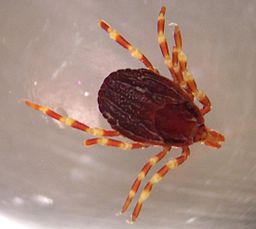 |
n/a | Status LU: casual. 1st record: 2018. |
 |
Gerändert Glasaenzeck | Status Eur.: established. |
 |
n/a | RA: ISEIA: n/a. Harmonia+: n/a. |
 |
n/a | Wikipedia: |
 |
n/a | Back to the list of invertebrates |
Contents
Report the species
→ Report Hyalomma marginatum to the National Museum of Natural History.
Brief description
 Hyalomma marginatum C. L. Koch, 1844 is a species of tick within the Ixodidae family, with a distribution in subtropical regions of the Old World. The sexual animals (imagines) suck blood from a variety of mammalian species, preferably hoofed animals, but occasionally also from humans. Immature forms occur on a variety of vertebrates, including migratory birds. The species has medical importance as a vector of Crimean-Congo hemorrhagic fever (CCHF) and typhus (Wikipedia Bearbeiter, 2020).
Hyalomma marginatum C. L. Koch, 1844 is a species of tick within the Ixodidae family, with a distribution in subtropical regions of the Old World. The sexual animals (imagines) suck blood from a variety of mammalian species, preferably hoofed animals, but occasionally also from humans. Immature forms occur on a variety of vertebrates, including migratory birds. The species has medical importance as a vector of Crimean-Congo hemorrhagic fever (CCHF) and typhus (Wikipedia Bearbeiter, 2020).
This tick has been implicated in the transmission of Bahig virus, a pathogenic arbovirus previously thought to be transmitted only by mosquitoes (Wikipedia contributors 2020).
Status and distribution in Luxembourg
Records of Hyalomma marginatum C. L. Koch, 1844 in Luxembourg. Data source: Recorder-Lux, iNaturalist & GBIF, 2026-03-03.
Two observations have been reported in the Recorder-Lux database so far (MNHNL, iNaturalist & GBIF 2022).
Risk assessment
No risk assessments have been done to date.
Worldwide distribution

GBIF 2020: https://www.gbif.org/species/4548126
Bibliography
- Direction de la Santé, 2016. Attention aux tiques! Comment se protéger? Dépliant. Luxembourg. URL: https://sante.public.lu/fr/prevention/tiques/
- GBIF, 2020. Hyalomma marginatum in GBIF Secretariat. GBIF Backbone Taxonomy. Checklist dataset https://www.gbif.org/species/4548126 [accessed 2020-11-02]
- MNHNL, iNaturalist & GBIF, 2020. MNHNL-mdata, online portal combining species observation from Recorder-Lux, iNaturalist and GBIF. National Museum of Natural History, Luxembourg. URL: https://mdata.mnhn.lu [accessed 2022-04-27]
- Weigand, A., J. Teixeira & S. Christian, 2020. First record of Hyalomma marginatum sensu stricto C.L. Koch, 1844 and distribution of Dermacentor reticulatus (Fabricius, 1794) (Acari, Ixodidae) in Luxembourg. Bull. Soc. nat. luxemb. 122 : 253-263. [PDF 1.79 MB]
- Wikipedia Bearbeiter, 2020. Hyalomma marginatum. In Wikipedia, Die freie Enzyklopädie. URL: https://de.wikipedia.org/wiki/Hyalomma_marginatum [accessed 2020-11-02]
- Wikipedia contributors, 2020. Hyalomma marginatum. Wikipedia, The Free Encyclopedia. URL: https://en.wikipedia.org/wiki/Hyalomma_marginatum [accessed 2020-11-02]
Suggested citation of this webpage
Ries, C. & M. Pfeiffenschneider (Eds.), 2026. Hyalomma marginatum C. L. Koch, 1844. In: neobiota.lu - Invasive Alien Species in Luxembourg. National Museum of Natural History, Luxembourg. URL: https://neobiota.lu/hyalomma-marginatum/ [Accessed 2026-03-03].
Page content last updated on 2022-05-03. Last proofread by Caroline Grounds on 2020-11-11.
